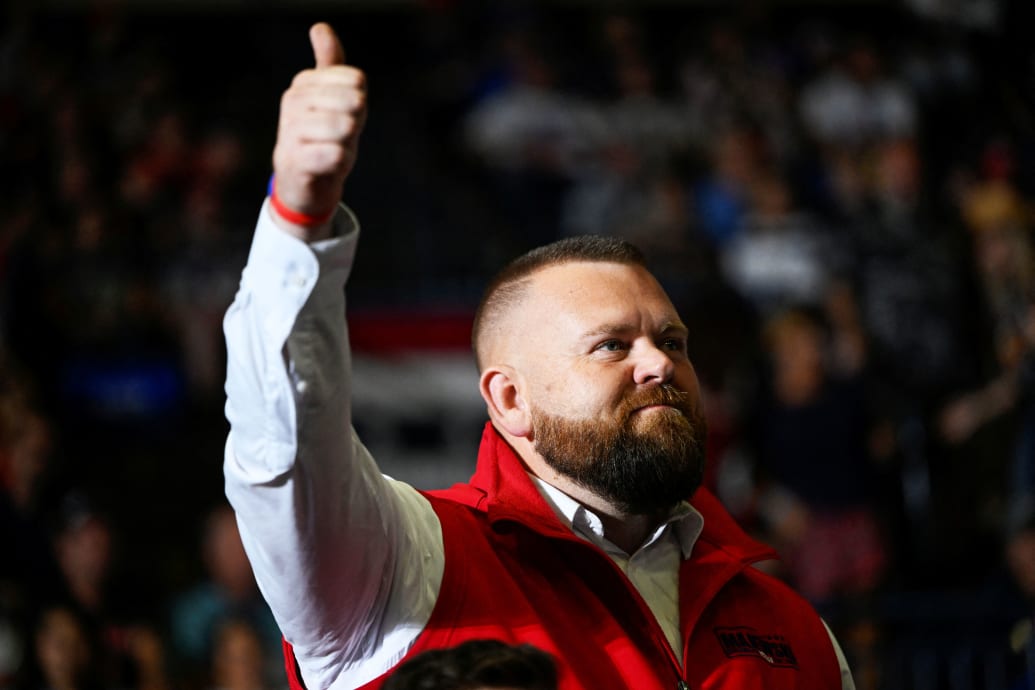A guy who carved a 19,000-square foot Donald Trump campaign sign onto his lawn and misrepresented his military service.
A Jan. 6 apologist with ties to Proud Boys and white nationalists.
A 27-year old Madison Cawthorn lookalike who ran in three different House seats in one cycle.
A former TV anchor who continues to claim she is the rightful governor of Arizona.
In a disappointing 2022 election for Republicans, these were the poster children for the “candidate quality” problems that GOP leaders like Mitch McConnell blamed for costing the party winnable races. Ahead of 2024, many Republicans are eager to move on from that shambolic crop of candidates.
There’s just one problem: the candidates themselves are just as eager to come back for seconds.
Months after losing their campaigns, a number of the GOP’s shoddiest standard-bearers have announced their plans to run again in 2024 or have stated they are considering doing so.
US Congressional Republican candidate J.R. Majewski gives a thumbs-up at a rally by former U.S. president Donald Trump in Youngstown, Ohio, Sept. 17, 2022.
Gaelen Morse/Reuters
MAGA champion J.R. Majewski lost to Rep. Marcy Kaptur (D-OH) in a Republican-majority district, imploding after news outlets revealed he greatly embellished his military record during the war in Afghanistan. Fresh off blaming GOP campaign organizations for his loss, Majewski is thinking about giving it another shot.
The Trump-backed Joe Kent was upset by Rep. Marie Gluesenkamp Perez (D-WA) after he ran an unabashedly far-right campaign in a moderate district; he’s already tweeted his intention to run again in 2024.
The incredibly clean-cut Bo Hines, who jumped from district to district in North Carolina, lost to Rep. Wiley Nickel (D-NC) in a swing district but quickly filed paperwork to run again.
The journalist-turned-gubernatorial candidate Kari Lake was narrowly defeated by then-Secretary of State Katie Hobbs in Arizona, then claimed baselessly and repeatedly that the election was stolen. As her supporters cling to the delusion she could still be installed as governor, Lake is openly entertaining a run for U.S. Senate in Arizona, and visited Washington, D.C., earlier this month to meet with senators.

Kari Lake speaks at America Fest, an event organised by Turning Point USA, in Phoenix, Arizona, Dec. 20, 2022.
Jim Urquhart/Reuters
Incidentally, so is Masters, who lost handily to Sen. Mark Kelly (D-AZ) last fall. The Peter Thiel protege ran such an off-puttingly hardline campaign that one high-ranking GOP operative reportedly said Masters had the worst focus group results of any candidate he’d ever seen.
Republicans are “increasingly concerned” about both Lake and Masters’ viability in an Arizona Senate contest, one GOP strategist told The Daily Beast.
All told, with over 20 months until Election Day 2024, at least six candidates who lost bids for the most competitive congressional races in 2022 are running again or considering it.
That’s bad news for Republicans who are seeking to expand on their paper-thin House majority and win back a majority in the Senate. While a “red wave” of anti-Democratic sentiment did not materialize nationally last fall, strategists on both sides believe the GOP would have likely won more difficult races had they not nominated flawed and fringey candidates.
“The lesson learned from 2022 is that candidate quality clearly matters,” said Ken Spain, a veteran Republican strategist. “The margin for error is extremely thin in 2024. If Republicans nominate some of these retread candidates, the majority becomes increasingly at risk.”
Democrats, meanwhile, can’t believe their luck. CJ Warnke, a spokesman for House Majority PAC, Democrats’ biggest outside group for House races, said they will do everything they can “to ensure these extremists become two-time losers.”
“By announcing their campaigns for 2024,” Warnke said, “they are already giving Democrats a head start on taking back the House.”
After the party took a hands-off approach to primary elections last cycle, some GOP campaign leaders have indicated they will intervene to boost better candidates. “We’re gonna do whatever it takes to win,” Sen. Steve Daines (R-MT), chairman of the Senate GOP campaign arm, told Fox News recently. “We want to make sure we have candidates that can win general elections.”
Daines succeeded in an early test last month, quickly endorsing Rep. Jim Banks for an open Indiana Senate seat before most of the potential field had announced their plans. Other Republicans backed off, averting a potentially costly primary.
Their House counterpart, the National Republican Congressional Committee (NRCC), has a policy of not getting involved in primaries.
Republicans expect that party leaders and donors will work especially hard to ensure their best candidates are on the ballot next November.
“I think that a lot of the groups—particularly pro-business, pro-growth, conservative groups that sat out this last election—will not sit out the next one,” said Sen. Kevin Cramer (R-ND). “And I think they will play in primaries, in a way that puts forward the more traditional Republican general election-appealing candidate.”
But they must do so carefully, Spain cautioned. For many GOP candidates today, the disapproval of the party establishment is a badge of honor that can only fuel their appeal among primary voters.
In a social media update on his 2024 plans, Majewski seemed eager to start that fight. “As I consider, I want to make it clear,” he said, “my decision will not be made by the D.C. Swamp or the political establishment.”
The dynamic encapsulates what might be the GOP’s biggest obstacle to avoiding a repeat of 2022. Not only is anti-establishment cred a valuable currency for candidates, the establishment itself has less power. Social media and right-wing media platforms allow candidates to build relationships directly with voters, and because the voters who decide GOP primaries are increasingly extreme and anti-establishment, hopefuls earn votes and campaign dollars by appealing to them.
Indeed, what many of 2022’s subpar Republican candidates had in common was MAGA-world notoriety, a lack of traditional political or governing experience, grassroots support, and, almost always, Donald Trump’s endorsement.
Majewski was one of the cycle’s best examples. In 2020, the northwest Ohio man won fame and support in right-wing media for mowing a massive Trump campaign mural onto his expansive lawn; in 2021, he attended the White House rally on Jan. 6 that preceded the Capitol insurrection, and months later posted videos of him rapping “Let’s go Brandon.”
When he filed to challenge Kaptur, a four-decade Democratic incumbent who was drawn into a more conservative district, it was expected Majewski would be bested in a GOP primary by an establishment-backed state senator.
But he won the primary, and shortly afterward, the Associated Press reported that he had misrepresented his experience in the U.S. Air Force, saying he saw combat in Afghanistan when he did not. The New York Times later reported he was demoted for a drunken driving incident while serving in Japan.
Despite Kaptur being one of the GOP’s top targets, the National Republican Campaign Committee canceled its TV ad reservations to boost Majewski, effectively ceding the race. In November, Kaptur blew out Majewski by a 13-point margin. In a tea-spilling column posted after Election Day, Majewski said neither himself nor Trump was to blame for his loss—it was GOP party leadership’s fault.
On the Senate map, Republicans’ hopes of capturing the majority were tanked by flawed recruits like Mehmet Oz in Pennsylvania and Herschel Walker in Georgia—neither of whom seems to be poised for a comeback anytime soon. But in Arizona, Masters is mulling a run for Democrat-turned-independent Sen. Kyrsten Sinema’s seat, perhaps inducing groans from Republicans who saw his last campaign as reflective of their 2022 struggles.

Republican U.S. Senate candidate Blake Masters speaks at America Fest, an event organised by Turning Point USA, in Phoenix, Arizona, Dec. 19, 2022.
Jim Urquhart/Reuters
In 2021, Masters—a venture capitalist in his mid thirties—entered a crowded GOP field vying to challenge Kelly. His main strengths were his alliance with Thiel, the ultra-conservative tech billionaire, and his willingness to appeal to the hardest edge of the GOP electorate. He posted videos of himself brandishing fancy firearms in the desert and declaring “Trump won” in 2020; some of his biggest fans—whom he eventually disavowed—were neo-Nazis.
With Trump’s endorsement, Masters vaulted above a crowded field and won the GOP primary. But he struggled to adjust to a contest with the well-funded and experienced Kelly. Last September, the top McConnell-linked super PAC pulled its TV ad reservations for Masters. He ultimately lost by five points, a margin that amounts to a blowout loss in traditionally Republican and sharply divided Arizona.
These candidates’ failures were so stark that some Republicans believe that voters will reject them again—with or without the nudge from powerful party forces. From Trump to further down the ballot, subpar candidates have cost the GOP dearly in recent years, and the mood among many voters is simply one of exhaustion over continued losses.
“There will be a lot of focus on institutional involvement in primaries and the D.C. GOP directing traffic, but voters only have to look at the scoreboard to see that, whatever appeal they might have had, these folks just aren’t winners,” said Liam Donovan, a GOP strategist and lobbyist. “After three elections in a row with subpar results for Republicans, exuberant losers just aren’t going to cut it.”
Still, throughout political history, losers have continued running until they became winners.
Cramer, for instance, noted his own experience losing two elections before winning a U.S. House seats. And he defended the last cycle’s crop of candidates, saying, “I just don’t think any of them were disqualifiers.”
“I don’t dismiss out of pocket the people who lost the first time as being weaker candidates. They’ll be better candidates next time,” Cramer continued. “It worked for Abraham Lincoln.”



